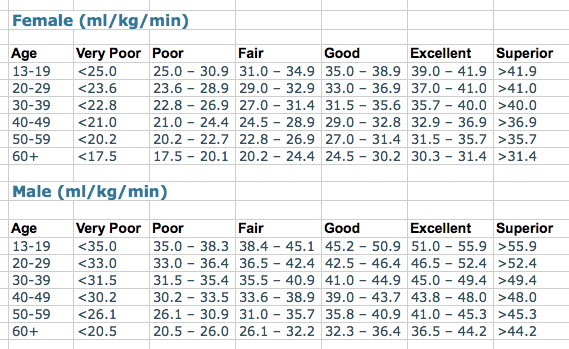This calculator will help you predict your aerobic capacity (VO2 max), as well as your achievable 5km and 10km times based on your results of a timed 2.4km run.
How does it work?
The results are calculated in two steps. First, the VO2 max is calculated using as 85.95 – (3.079 * [2.4km Run Time in minutes]), a formula proposed by Burger et al. (1990) [1] with a standard error of ±2.24-2.91 ml/kg/min.
Second, to predict your timings for 5km and 10km runs, the following formula is used: T = To * ((D/2.4)^1.06) where To is your 2.4km time, D is the distance to predict a time for, and T is the estimated time for D. This formula was proposed by Pete Riegel, and published in Runner’s World by Owen Anderson in 1997. It roughly says that a person’s speed declines by around 6% when the distance doubles.
Caveats
– The time predictions are estimates of what a runner might achieve, if they train appropriately for the distance. It assumes that you have trained appropriately for the distance. Doing a 22-minute 5K today doesn’t mean you can do a sub-4 marathon tomorrow.
– The time predictions are based on average reduction of speed as the race distance increases, and this relationship will vary from person to person.
– It assumes you don’t have a natural significant bias towards either speed or endurance.
– The calculations become less accurate for times under three and a half minutes and over four hours.
VO2 Max
VO2 max is a measure of the maximum volume of oxygen that an athlete can use. It is measured in millilitres per kilogramme of body weight per minute (ml/kg/min). Maximal oxygen consumption reflects the aerobic physical fitness of the individual, and is an important determinant of their endurance capacity during prolonged, sub-maximal exercise. More info [wikipedia].


